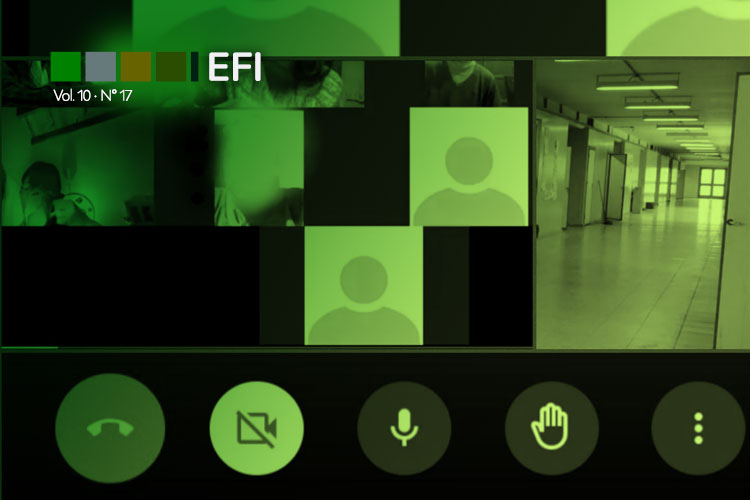EDUCATIONAL LINK AND BIMODALITY
RESEARCH TERRITORY AND LEARNING EXPERIENCES
Keywords:
higher level research, teacher training, pedagogical link, learning experience, research practicesAbstract
This article focuses on the research process that involved launching the project entitled “The pedagogical link in Teacher Training: the case of third-year teachers and students of the IES Eduardo Lefèbvre de Laboulaye, during 2021, in the context of health emergency”. The project turns out to be approved in the 2021 Call for Research Projects, launched by the National Institute for Teacher Training (INFoD).
The research work gave an account of the characteristics that the pedagogical link acquired in the aspects: relational, didactic and the use of ICTs, in teachers and students who passed the 3rd year in the 2021 school year within the framework of bimodality in the IES Eduardo Lefebvre, located in the city of Laboulaye. In the research carried out, it was possible to observe that in the absence of physical co-presence as an outstanding characteristic of the pedagogical bond as we knew it, new forms of the relationship between students and teachers arise within the framework of an incipient bimodality.
In the section called “Findings”, the main data found and answers to the questions formulated in the research carried out are presented. Here, the absence of physical co-presence in a situation of teaching in the DiSPO context stands out, and features of a distance between teaching and learning in this context are evident.
Finally, a reflection is offered on research as a learning process, as work that shapes a particular pedagogical experience and affirms research as a necessary territory in the higher education of teachers.
References
Achilli, E. (2023). Investigación en la formación docente: Algunas pistas teóricas metodológicas. Educación, formación e investigación, 9(14), 13-28. https://revistas.unc.edu.ar/index.php/efi/article/view/41005
Ameijeiras, M. J. (2020, 19-20 de noviembre). Ventanas que guardan sueños. La construcción del vínculo pedagógico en la formación docente inicial [ponencia]. III Jornadas de Formación Docente - INFOD, Buenos Aires, Argentina.
Bourdieu, P., Chamboredon J. C. y Passeron, J. C. (2008). El oficio del sociólogo. Presupuestos epistemológicos. Siglo XXI.
Carlino, P. (2020). Reflexión pedagógica y trabajo docente en época de pandemia. En Beltramino, L. (Comp.), Aprendizajes y prácticas educativas en las actuales condiciones de época: COVID-19 (pp. 86-91). Universidad Nacional de Córdoba. https://www.aacademica.org/paula.carlino/271.pdf
Dussel, I. Ferrante, P. y Pulfer, D. (2020). Pensar la educación en tiempos de pandemia II. Experiencias y problemáticas en Iberoamérica. UNIPE, CLACSO. https://editorial.unipe.edu.ar/colecciones/politicas-educativas/pensar-la-educaci%C3%B3n-en-tiempos-de-pandemia-ii-experiencias-y-problem%C3%A1ticas-en-iberoam%C3%A9rica-detail
Miguel, C. (Dir.) (2022). El vínculo pedagógico en la Formación Docente: el caso de los docentes y estudiantes de tercer año del IES “Eduardo Lefèbvre de Laboulaye”, durante 2021, en contexto de emergencia sanitaria. (proyecto 144) [beca] Instituto Nacional de Formación Docente.
Narodowski, M., Catri, G., Nistal, M. y Volman, V. (2021). Dinámica escolar y organización familiar en pandemia. Estudio cualitativo realizado a familias de barrios populares. Observatorio Argentinos por la Educación.
Pichon Rivière, E. (1988). El proceso grupal. Del psicoanálisis a la psicología social. Nueva Visión.
Rockwell, E. (2007) Huellas del pasado en las culturas escolares. Revista de Antropología Social, 16, 175-212. https://www.redalyc.org/pdf/838/83811585007.pdf

Downloads
Published
Issue
Section
License

This work is licensed under a Creative Commons Attribution-NonCommercial-ShareAlike 4.0 International License.
Atribución No Comercial Compartir Igual (by-nc-sa):
No se permitirá un uso comercial de la obra original, ni de las posibles obras derivadas, la distribución de las cuales se debe hacer con una licencia igual a la que regula la obra original.






